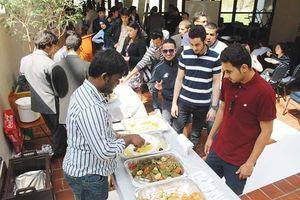Murray University Muslim Students Hold ‘Discover Islamic Culture’ Event

The event, called “Discover Islamic Culture,” was held at the Curris Center Dance Lounge and featured many large displays created by MSO members to educate the public about Islam. MSO President Naif Alotaibi said the displays were meant to clear up a lot of misconceptions people have about Islam. For example, he said many people think Muslims hate non-Muslims, but the Prophet Muhammed lived alongside Christians and Jews in peace, Murray Ledger reports.
Alotaibi said many people also think Muslims hate Jesus Christ, but Muslims actually love and respect Jesus and believe he was one of God’s greatest prophets and messengers. Muslims also believe, as Christians do, that Jesus will return to Earth on Judgement Day, he said.
One display explained that the Quran — the Islamic holy text Muslims believe was a revelation to Muhammed from God, or Allah — forbids violence and acts of terrorism. Another display about guaranteeing human rights said the Quran states that God has created all of humankind equal and has given each person the right to pursue his or her own destiny. It also said freedom of conscience is an essential tenant of Islam and that truth can only be seen if it is not “clouded by coercion.”
Also featured at the event were several female Muslim students, who were available to talk about the hijab, which many Muslim women use to cover their heads. Susan Haroon, a student from Egypt, said no one can obligate a woman to wear a hijab, but instead women who wear it do so because they feel they have been commanded by God to wear it. She said many Muslim women feel that it liberates them from being oppressed by society. She said it is not a symbol of inequality between men and women, and noted that Muslim men also dress to cover most of their bodies to preserve their modesty.
Abdulaziz Faqihi, who handled media and public relations for the event, said the MSO was very appreciative to MSU President Dr. Bob Davies for opening the event Tuesday morning. He said Davies was very complimentary of the MSO’s efforts in organizing the event and that it was an important way to educate others about their culture.
“Every single thing here was made by students,” Faqihi added.
Attendees at the event could also watch a documentary about the Prophet Muhammed and a documentary called “Islam and Science.” The public was also treated to a meal and an array of sweets popular in Islamic countries.



